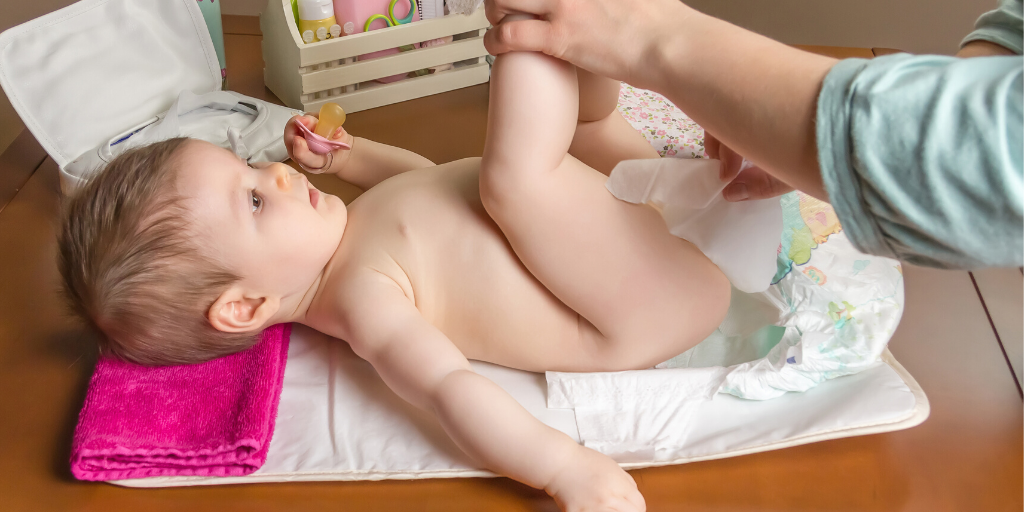Common Causes of Infant Constipation And Practical Treatment Options You Can Apply Straight Away
Here are the more common causes of infant constipation from day one of life to 5 years of age. Note the difference in frequency of stool passage in breastfeed and bottle-fed babies, what is normal and what is abnormal and what you can do today to help ease your baby's constipation.
 Causes of infant constipation are often benign.
Causes of infant constipation are often benign.Constipation is very common in children.
This is even more so between the first day of life until age 5.
Thankfully, most causes of constipation in children are not serious. In fact, the evidence shows that 95% of constipation in children is not caused by other diseases or anything serious.
But to fully understand the causes of infant constipation, it is very important to know what constipation is and what is the normal stool pattern in children across the different age groups.
Bottled-feed babies tend to pass less stool than breastfeed babies.
What Is Constipation
Constipation is a medical word used to describe either the infrequent passage of stool below what is expected at that age and diet type and or the passage of hard-formed stools.
So your child may be constipated if he or she is:
- Passing stool less often than what is expected for age and diet
- Passing hard painful stools
- Passing small hard faeces that may or may not be blood stained
- Frequently soils their underwear, in the case of older children who are already potty trained.
Obstipation is the complete absence of bowel emptying
What Is Normal Frequency Of Bowel Emptying For Babies Between Ages 24 Hours To 3 Months Of Life?
 Normal stool frequency in a baby depends on diet type, age and microbiome constitution.
Normal stool frequency in a baby depends on diet type, age and microbiome constitution.Most babies will empty their bowls within the first 24 hours of birth. This is called the passage of meconium or the first poop.
Some other newborn babies may take up to 36 hours before they empty their bowls or pass their first poop.
So if your baby does not open his bowel within this time frame, be sure to speak with your healthcare provider.
Once the first bowel movement is established, it shows that your baby has a patent and functional gut and anus. What happens next will depend largely on whether or not she is breastfeed or bottled feed, the component of her diet and those of the mother if breastfed and its inherent characteristics and microbiome or gut bacteria pattern.
In the first few days of life:
- Most children will pass stool for an average of 4 times a day
- Breastfeed babies will pass stool every time after they are breastfeed or at least 3 times daily
- Bottle feed babies will pass stool only once or twice daily, although this can also be as much as 4 times daily
This pattern continues into the 3 rd month of life.
A change in the formula feed or diet of the mother (in the case of breastfeed babies) may also cause a change in frequency as well as consistency of your child's stool.
The more milk you produce if you are breastfeeding your baby, the more often he or she will open his bowel. Conversely, if you are unable to make a lot of breast milk, even if you are breastfeeding, your baby may pass less stools. Breast milk has a mild laxative effect, and causes children who are breastfeeding to open their bowel almost after each feed.
For bottle-fed babies, soy containing mild formulas tends to cause harder stools while hydrolyzed casein formulas will lead to more frequent stool passage.
If your baby is cow's milk intolerance, he or she could also develop constipation if you continue to consume milk, yourself.
What Is Normal Frequency Of Bowel Emptying For Babies Between Ages 3 To 6 Months
By the 3rd month of life, most babies would have established a steady bowel emptying pattern that is maintained until age 6 months of life when new food types - pureed fruits, more adult type foods are introduced into their diet.
At this age, it is normal for most to pass stool 1 to 5 times daily and for some babies, even once every other day.
As long as your baby looks healthy and eating well and happy, with no massive strain during bowel movement, there should be no cause for concern.
We mentioned “massive” strain because it is normal for many babies under one year of age to strain to some degree when opening their bowel.
Normal Frequency of Stool From Age 6 Months To 1 Year
Between the ages of 6 to 12 months, your baby should be passing stools anywhere from 1 to 4 times a day to once every other day.
Passing no stools for more than 2 to 3 days should alert you to having him or her assessed for constipation.
Normal Frequency of Stool From 1 To 3 Years
Now your baby has started standing up or maybe even walking and running, more matured, understanding his or her environment more and having conscious control of a few things.
Its stool frequency pattern could be impacted by so many factors from dietary, amount of fluid intake, microbiome, to voluntary with-holding of stools.
At this point, most children will open their bowls 1-3 times a day or after every day or two.
Normal Stool Frequency After Age 3 years
Congratulations. Now that you are potty training or child or in some cases, there are already potty trained.
Stool frequency at this age is usually anywhere between 1 to 2 per day or after 1-3 days.
Here is a table to provide a quick glance picture of what frequency of stool is normal at what age
Age
|
Number of Bowel Movement Expected per day |
|
0 - 3 Months Breast Feed 0 - 3 Months Formula feed 3 - 6 months 6 - 12 months 1- 5 years |
1 to 5 1 to 3 (or after every 1-2 days) 1 to 4 (or after every 1-3 days) 1 to 3 (or after every 1 - 3 days) 1 to 2 (or after every 1-3 days) |
How Stool Is Formed
The causes of infant constipation can be better understood if we take a brief look into how stool is formed, stored and passed out of our system.
Any disruption or alteration in the natural process of stool formation and passage would cause constipation or diarrhea.
Here is what happens:
- Ingested food passes down our stomach into the small intestines where most of the digestions take place.
- The unwanted bits pass down to the large intestines as a thick pasty liquid.
- This movement down the bowel is achieved by the action of the muscles of the wall of the bowel.
In the colon or large intestine, 95% of the liquid pasty unabsorbed meal is reabsorbed as water, leaving behind formed stool.
The formed stool moves down further to the rectum, a 25 cm tube with three lateral bends. As more faeces pass down to the rectum, the wall is distended, and a critical point is reached where it sends messages to the brain that the bowel needs to be opened to let faeces or defecate.
There are two sphincters or valve-like muscles that guard the gate from the rectum and anus to the external world.
These are controlled by local impulses from the bowel nerves and impulses from the brain. Working in unison, the sphincter controlled by bowel impulse causes faecal material to move down and once it is socially acceptable, controls from the brain help to complete the process.
If we override this impulse to pass faeces, the stool remains and it is stored in the lower colon and rectum. This allows even more water to be absorbed out of the fecal material, making it firmer.
Weakness of the intestinal or large bowel muscles would lead to constipation, as would refusal to use the toilet over a prolonged time despite the urge to defecate arising from fear of defecation, especially seen in children who are potty trained but are not ready.
Thus, infant constipation could arise from a failure of this elaborate mechanism or from a conscious or subconscious instruction from the brain to stop bowel opening.
This is what doctors call functional constipation.
Common Causes of Infant Constipation
Causes of Constipation In First Week of Life
Is your baby constipated in the first 7 days of life? The following may be causing it and this is what you can do:
- Anal stenosis
- Anal stricture
- Hirschsprung disease
- Absent abdominal wall muscles
- Effect of maternal narcotic use
- Congenital hypothyroidism
- Cystic fibrosis
- Spinal cord disease.
If he or she has not passed stool within the first 24 hours of birth, wait. A few newborns take up to 3 days before they open their bowel. Before then though, bring this to the attention of your doctor if no stool in the first day.
An examination of his or her anus may be necessary. A common cause of infant not passing stool the first 24 to 72 hours of life is a condition called imperforate anus. Your doctor or healthcare provider may pass a small thermometer or little finger up to see your baby's anus if the passage is patent.
If it is patent, then any of the above other causes may be responsible.
Causes of Constipation In The First 3 Months Of Life
The common causes of infant constipation in the first three months of life include:
- Formula feeds - bottle fed babies tend to be more constipated that breastfed babies for reasons explained above. Also highly concentrated formula feed mix could lead to constipation at this age, especially if the measurement instruction on the formula milk is not strictly adhered to. If your baby develops new onset constipation, review the way you prepare his or her formula feeds and see if there is room for more water addition as per the manufacturer's guide.
- Dehydration. If you suspect that your baby may be dehydrated, increasing his or her fluid intake may be necessary.
- Medications. Certain medicines used in babies can cause constipation - like cough medicines.
- Under-active thyroid. This is not very common. If your baby continues to be constipated for a long time, a thyroid blood test may become necessary.
- Cystic fibrosis. Many countries routinely test all newborn babies for cystic fibrosis within a week of birth. If your baby is already diagnosed with cystic fibrosis, then perhaps this could also be the cause of his or her constipation. Speak to your health care provider.
- Renal tubular acidosis - a condition affecting the kidney
- Urinary tract infection (UTI) could occur in children and can lead to constipation. The child will be unwell apart from being unable to open his or her bowel.
Causes of Constipation In Children Ages 3 to 12 Months
Causes of infant constipation between 3 and 12 months of age will include:
- Recent change in diet
- Inadequate fluid intake
- Fever
- Cystic fibrosis
- Hypo functioning thyroid
- Low potassium levels
Causes of Constipation Between Ages 1 to 5
All of the above causes could also cause constipation at ages 1 to 5, but the most common cause of constipation after age 1 are:
- Functional constipation. 95% of constipations at this age range are functional due to voluntary stool with holding
- Changing in diet
- Inadequate fluid intake
- Inadequate fiber and vegetable intake
Practical Treatment Options To Help Relieve Your Infant's Constipation
See practical treatment tips for infant constipation here .



